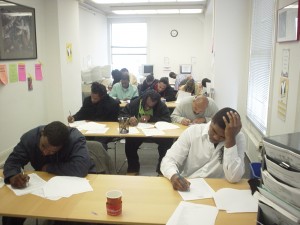
America Works’ Oakland office’s clients are referred by select Alameda County deputy probation officers.
While many job developers seem to find working with ex-offenders a particular challenge, one company has found a successful niche in outcome-based prison-to-work (and welfare-to-work) programs.
With operations in New York City; Chicago; Washington, D.C.; Baltimore; Newark and Mount Laurel, N.J.; Albany, N.Y.; and Oakland, Calif, America Works is an employment agency – or employment service as it refers to itself – but an employment agency with a difference.
It partners with government agencies to serve hard-to-place individuals, and among the company’s many programs is one in Oakland, Calif. that works with the Alameda County Probation Department through its America Works of California, Inc. division. During its first six years in Oakland, the company’s efforts were funded by the city’s Measure Y initiative, which was passed by Oakland voters in 2004 and provides $20 million per year through a parcel tax to fund a variety of services including those dealing with reentry.
America Works’ Measure Y funding is coming to an end, and it is now working with Alameda County, where Oakland is located, to serve those affected by the state’s so called “public safety realignment.” To deal with its severely overcrowded state prison population, the California Assembly passed AB (Assembly Bill) 109, which went into effect on Oct. 1, 2011, and realigns certain responsibilities for lower level offenders, adult parolees and juvenile offenders from state to local jurisdictions.
“The probation departments’ caseloads have gone through the roof with the realignment,” says Matt Ericksen, executive director of America Works of California. “If the state wants to be successful, it has to get these guys back to work.”
And that’s where America Works comes in. It receives referrals from select deputy probation officers for ex-offenders who are categorized as post-release, community supervised under AB109. “Fifty-three percent of those referred to us actually come in,” Ericksen says. Some of them have found other things, and others just don’t want to work, he adds.
Those who come to America Works receive job readiness training that concentrates on soft skills, computer skills and issues like anger management. Staff members do a needs assessment and help them obtain things like a driver’s license and social security card, and connect them to various social service agencies to get food, housing, interview clothing and substance treatment if needed.
Once participants complete the job readiness training they meet with the company’s job developer, who spends a great deal of time and effort developing relationships with many communities in Alameda and Contra Costa counties, getting to know the employers and potential opportunities.
It’s not just about finding the right job for an applicant, however, but about finding the right applicant for a particular job and company, something America Works has become quite skilled at. The recidivism rate for those who have found work through its efforts is only 5 percent, according to Ericksen.
Industries that the company focuses on are construction, retail, telemarketing, transportation and food. It also received training dollars to offer the 40-hour HazWOpER (hazardous waste site worker) certification training about a year and a half ago – with participants placed in positions in a variety of places, including the Chevron Refinery in Richmond, Calif. – and is currently in the process of putting together another class.
The company’s job developer places more than 100 ex-offenders each year, and this year will place more than 138.
The key to the job developer’s success? “It’s not only understanding the employer but also understanding the job seeker. One of the first questions she asks is what can you do and what do you want to do,” Ericksen says. “We had someone come in who was an artist, and we found him a job in a tattoo studio.”
In spite of the company’s achievements, it hasn’t been easy. “One challenge is the level of frustration. So many doors have been slammed in their face,” he adds. “It takes a little bit of time. Sometimes people will call and say, ‘Why haven’t you found me a job?’”
Ericksen and his colleagues understand the frustration and do everything they can to help ensure their clients find – and keep – jobs.
“The most successful guys coming out of prison are those with a support system. If they don’t have one, we provide it. We stay engaged and keep them engaged,” he says.
For more information about America Works, check out its website at www.americaworks.com


I have a friend going before the parole board next month. She took online courses and has a vet. assist. degree. Know of any place?
The best thing we can recommend for your friend is for her to call various veterinary clinics in her area and ask to talk to the veterinarians. There’s lots of job search information in the “New Entry Job Hunting Plan” on the home page of this website. You might want to tell her to download it or download it yourself and give it to her. Good luck to her.